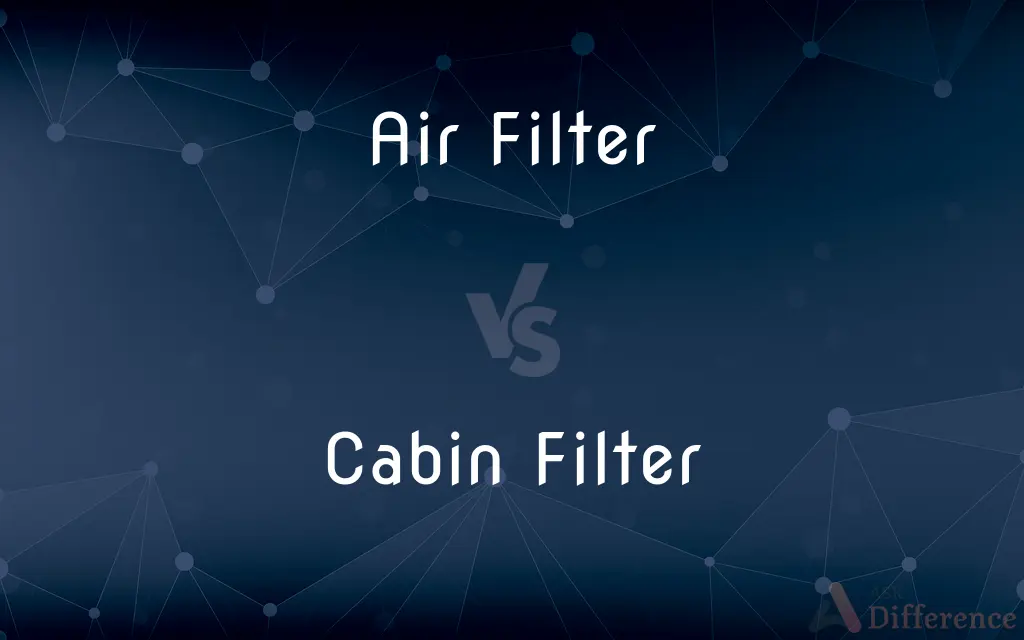Air Filter vs. Cabin Filter — What's the Difference?
By Tayyaba Rehman — Published on November 9, 2023
An Air Filter cleans the air entering an engine, while a Cabin Filter purifies the air inside a vehicle's cabin.

Difference Between Air Filter and Cabin Filter
Table of Contents
ADVERTISEMENT
Key Differences
Both Air Filters and Cabin Filters play crucial roles in vehicles, ensuring clean air flow. An Air Filter is primarily designed to prevent harmful debris, like dirt and dust, from entering the engine. This is essential because these contaminants can cause wear and damage to the engine components. The primary role of the Air Filter is to ensure the engine receives clean, debris-free air for optimal combustion and performance.
In contrast, a Cabin Filter's primary job is to clean the air that circulates inside the cabin of the vehicle. It filters out pollutants, pollen, dust, and even odors, enhancing the air quality inside the car. While the Air Filter focuses on engine health, the Cabin Filter concentrates on the occupants' comfort and health.
It's important to note that while both filters cater to air quality, they operate in different areas of the vehicle. The Air Filter is generally located in the engine compartment, directly linked to the engine's intake system. The Cabin Filter, on the other hand, can be found behind the glovebox or under the dashboard, directly affecting the air that comes through the vehicle's vents.
Maintenance of both these filters is essential. Over time, the Air Filter can become clogged with debris, reducing engine efficiency and performance. Simultaneously, a dirty Cabin Filter can lead to poor air quality inside the cabin, affecting passengers' health and comfort. In essence, while the Air Filter ensures engine longevity and efficiency, the Cabin Filter ensures a comfortable, pollutant-free ride for the vehicle's occupants.
Comparison Chart
Primary Role
Cleans air entering the engine
Purifies air inside the vehicle's cabin
ADVERTISEMENT
Location
Engine compartment
Behind glovebox or under dashboard
Protection Against
Dirt, debris affecting engine
Pollutants, pollen, odors inside cabin
Maintenance Result
Affects engine performance
Affects cabin air quality
Directly Affects
Engine's combustion and performance
Comfort and health of vehicle occupants
Compare with Definitions
Air Filter
Air Filters are typically made of pleated paper or fibrous materials.
The mechanic recommended replacing the paper Air Filter with a cotton one.
Cabin Filter
The filter enhances the vehicle's HVAC system efficiency.
The air conditioning worked better after replacing the Cabin Filter.
Air Filter
Air Filters can impact the vehicle's mileage and power.
After changing the Air Filter, I noticed improved acceleration.
Cabin Filter
It's responsible for filtering out pollutants, pollen, and odors.
The new Cabin Filter drastically reduced the musty smell inside the car.
Air Filter
They are located in the engine compartment of vehicles.
During the service, they cleaned the area around the Air Filter.
Cabin Filter
Cabin Filters are typically found behind the glovebox or under the dashboard.
The manual showed the Cabin Filter location behind the glove compartment.
Air Filter
An Air Filter is designed to prevent contaminants from reaching the engine.
A clogged Air Filter can reduce the vehicle's fuel efficiency.
Cabin Filter
A Cabin Filter ensures clean air circulates inside the vehicle.
My allergies act up if the Cabin Filter isn't changed regularly.
Air Filter
They are essential for optimal engine combustion and performance.
To maintain peak performance, regularly check your Air Filter.
Cabin Filter
They directly affect the comfort and health of vehicle occupants.
With a clean Cabin Filter, long drives become much more pleasant.
Common Curiosities
Why is the Cabin Filter essential for drivers and passengers?
The Cabin Filter ensures clean, pollutant-free air circulates inside the vehicle, enhancing comfort and health.
How do I know my Cabin Filter needs replacement?
Reduced airflow from vents and unpleasant odors can indicate a dirty Cabin Filter.
How often should I change my vehicle's Air Filter?
Typically every 12,000 to 15,000 miles, but consult your vehicle's manual for specifics.
Where can I purchase a Cabin Filter for my car?
Auto parts stores, dealerships, and online retailers sell Cabin Filters.
What's the primary role of an Air Filter in cars?
An Air Filter cleans the air entering the engine, ensuring optimal combustion.
Can a dirty Air Filter affect fuel efficiency?
Yes, a clogged Air Filter can reduce fuel efficiency and engine performance.
Are these filters interchangeable?
No, Air Filters and Cabin Filters have distinct designs and functions.
What materials make up the Air Filter?
Typically pleated paper, cotton, or other fibrous materials.
Can I clean and reuse my Air Filter?
Some reusable Air Filters can be cleaned, but most paper filters should be replaced.
Can I install a Cabin Filter myself?
Yes, with the right guide and tools, many can replace their Cabin Filter.
Does a Cabin Filter affect the air conditioning?
Yes, a dirty Cabin Filter can reduce the efficiency of the HVAC system.
How does a dirty Air Filter affect the engine?
It can lead to reduced combustion efficiency, power, and even potential engine damage.
What happens if I don't change my Air Filter?
Neglecting it can lead to reduced engine performance, efficiency, and potential damage.
Are Cabin Filters expensive?
Prices vary, but generally, they are affordable and essential for maintaining air quality.
Share Your Discovery

Previous Comparison
Akita vs. Shiba
Next Comparison
Solar Flare vs. CMEAuthor Spotlight
Written by
Tayyaba RehmanTayyaba Rehman is a distinguished writer, currently serving as a primary contributor to askdifference.com. As a researcher in semantics and etymology, Tayyaba's passion for the complexity of languages and their distinctions has found a perfect home on the platform. Tayyaba delves into the intricacies of language, distinguishing between commonly confused words and phrases, thereby providing clarity for readers worldwide.













































